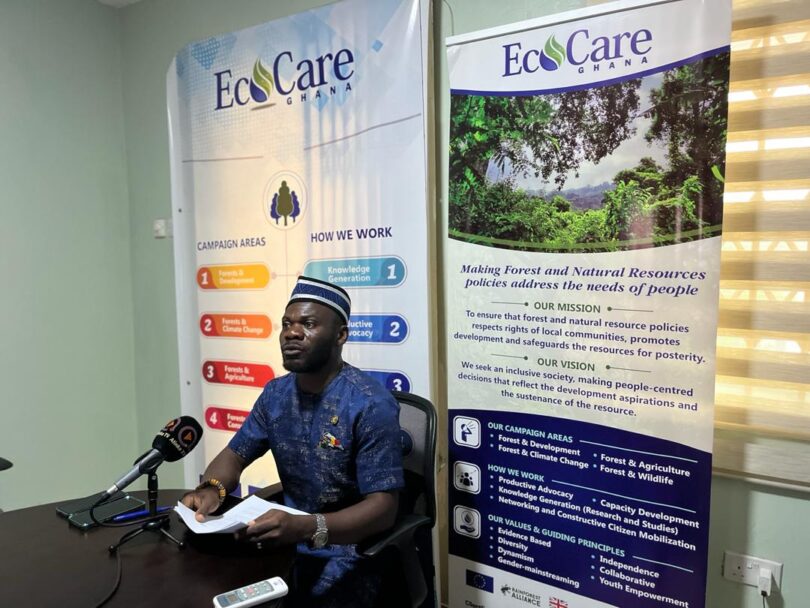Report by: Ishmael Barfi
For Ghanaian farmers in the cocoa sector to meet the Legislation requirements that would help them to earn a decent income and standard of living, the Government, Non-Governmental Organizations (NGOs), Civil Society Organizations (CSOs), chocolate-producing companies as well as relevant stakeholders have been called upon to work tirelessly to achieve this feat.
One of these Legislation is the European Union Deforestation Regulation (EDUR) compliance that speaks of fair compensation of cocoa farmers for their hard work and commitment.
Mr. Obed Owusu-Addia, the Managing Campaigner for EcoCare Ghana made this call at the launch of the Fifth Edition of the Chocolate Scorecard (2024), held in Accra on 20th March 2024 by EcoCare Ghana, in partnership with Be Slavery Free and Mighty Earth.
This Fifth edition of the Chocolate Scorecard (2024) finding was on the theme: ”Making sure that the chocolate you eat is good Chocolate”
The Scorecard revealed that the chocolate industry is undergoing significant improvement however, faces challenges such as farmer’s poverty which remains a major concern and unattended to by relevant stakeholders in the chocolate industry.
Interacting with the media, Mr. Obed Owusu-Addai, Managing Campaigner for EcoCare Ghana explained that, this year chocolate Scorecard recommended the need to scale up interventions on Child labor to eradicate it in all supply chains.
He said this is relevant in the quest to address the root causes of child labor, and poverty, which is prevalent in the cocoa communities.
“There is the need for traceability that would focus on addressing the root causes such as poverty that leads to its prevalence,” he reiterated.
The recommendation on child labor and forced labor further called on companies to come together and work with the government for a nationwide program that would be more effective than working in silos.
On other recommendations, the EcoCare Ghana Managing Campaigner stated the need for Companies to work towards reducing pesticide use and implementing more sustainable farming practices to protect farmers and the environment to ensure the long-term viability of cocoa.
“Because of the hazardous nature of some pesticides, farms have been depleted, killing bees and butterflies, so I urge the Food and Drugs Authority (FDA), Ghana Standards Authority (GSA), and Cocobod to ensure that, chemicals that come into the market to be used by cocoa farmers, meet the minimum standard and are not hazardous to insects on the farms,” he called out.
He further urged authorities to ensure that those chemicals are not hazardous to people namely children accompanying their parents to help on cocoa farms and not being exploited.
He further called on Ghana’s Cocobod and the Ministry of Agriculture, to work with farmers to absorb agroforestry practices and plant trees on their farms while they put systems in place to trace cocoa from its origin to the point of export.
He noted that the above is one of the key components of the EU Deforestation Regulations and Ghana as cocoa producing country needs to comply with these regulations.
The findings also revealed that poverty is one of the challenges cocoa farmers are facing and attributed it to companies not paying the right price for their cocoa beans.
To alleviate that, chocolate companies are charged to pay commensurate rates for beans that farmers produce to cover their production and have some to take care of their families.
Chocolate companies under this year’s Scorecard were rated using six thematic areas namely; Traceability and Transparency, Living Income for farmers, Child Labour, Deforestation and Climate Change, Agroforestry, and Pesticides.
Mr. Obed Owusu-Addai noted that improvements in traceability are evident in response to EU Deforestation Regulations (EUDR), yet achieving full EUDR compliance remains a work in progress.
Investing in national traceability systems such as the Cocoa Management and Traceability System (CMS) being developed by the COCOBOD, he noted is the best way to go.
He further reiterated that it is the responsibility of the companies to ensure that farmers get a decent income from cocoa.
Source: www.thenewindependentonline.com








